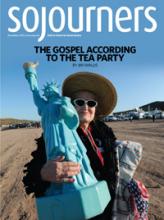Kimberly Culbertson knew God was real and present in the lives of the high school kids she taught in inner-city Chicago -- real and present in the midst of equally real poverty, violence, addiction, and sexual activity. She began to write about her experiences with the young people she worked with and looked for writing communities and places to publish. Culbertson naturally turned first to Christian outlets, which she assumed would welcome the integration of faith in her writing.
What wasn’t welcome, she found, was the accurate portrayal of details in stories she wanted to tell.
"I learned the rules of Christian writing: No swearing," she told the audience at a panel on small presses and magazines at Calvin College’s Festival of Faith and Writing last April. "No depiction of sexuality, even if it’s 'in bounds.' No sin that goes unpunished." Culbertson was left in a quandary. As she put it, "Gangbangers do not say 'Fiddlesticks.'"
At the same time, she knew that writers who authentically explore and depict issues of faith can find that their work is a hard sell to many secular publishers, who seem befuddled by or dismissive of religious content or skeptical of storylines that dare speak of even small "r" redemption or revelation.
Read the Full Article

